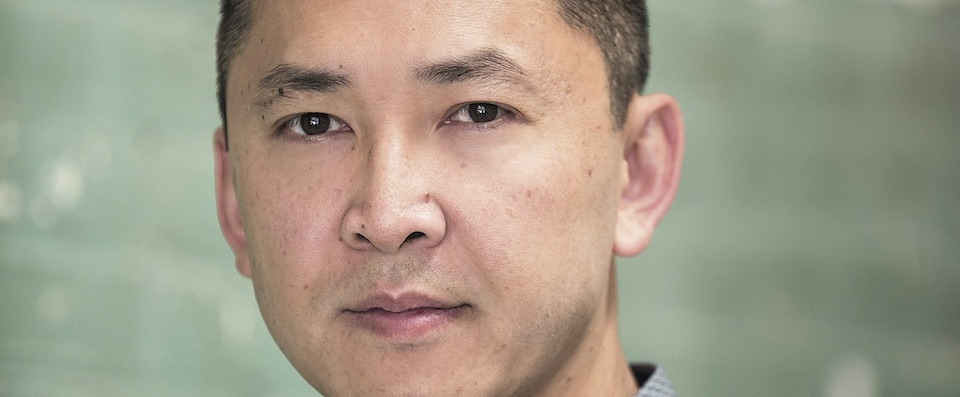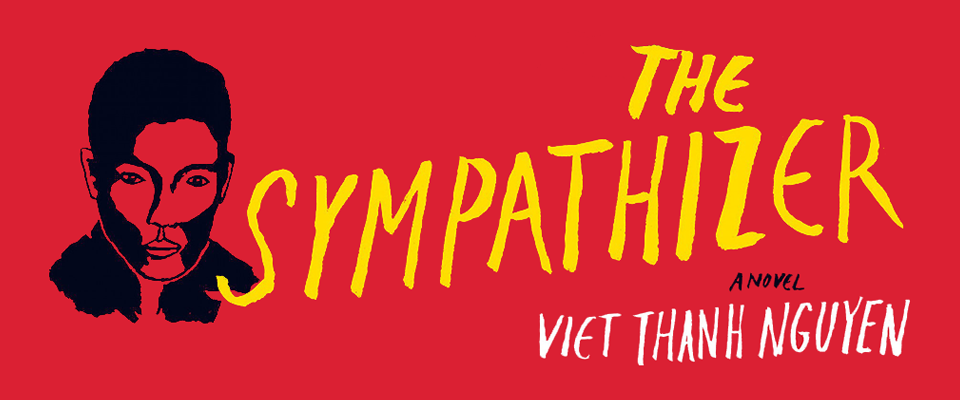When telling a story, and it doesn’t matter if that story is long or short, fiction or nonfiction, the marginalized writer must be defiant.
So says writer Viet Thanh Nguyen.
Defiant is not the first descriptor that comes to mind for this particular writer, a Vietnamese refugee and UC Berkeley alumnus, who in fall 2016 wore a royal blue suit, purple tie, and orange socks at the Pulitzer awards banquet in Manhattan to accept the Fiction award for his debut novel, The Sympathizer (Grove Press, 2015). Flamboyant, maybe. Defiant, no.
“It was the only way I could stand out while standing next to Lin-Manuel Miranda,” Nguyen joked on Twitter, tagging the popular playwright who was picking up his award for the hit musical Hamilton.
More than flamboyant or defiant, Nguyen seems gentle. That was the word that sprang to mind for me, at least, during my hour-long interview of Nguyen in October. And not just because he looks and sounds like the thoughtful and nurturing English professor he is (Nguyen teaches English and ethnic studies at the University of Southern California). Rather, it was his habit of interrupting the conversation—several times—to patiently take questions from his 3-year-old son, Ellison. That, and the way he ended the call promptly so as not to be late for a date with his wife, Lan Duong, also a university professor and, according to Nguyen, a loyal fan of his work. She reads everything he writes, he says.
OK, he admits it; he’s a nice guy.

But a serious one. He may lead a charmed life now, but both The Sympathizer, a darkly satirical novel about a double agent working for the Viet Cong who goes to the U.S. with South Vietnamese soldiers, and his nonfiction book Nothing Ever Dies: Vietnam and the Memory of War (Harvard University Press, 2016) attest to the gravity of Nguyen’s worldview and, yes, his defiance.
“I have an adopted sister. We had to leave her behind when my family left Vietnam. We never saw her for another 30 years. I was 4 years old and have no memory of her growing up, but we had this black-and-white picture of her on the mantle. I would see it every day. That was very haunting for a child, to try to make sense of her absence and the loss of our country, relatives who had died in the war, these things we left behind,” he remembers.
The haunted aspect of his personality is a reflection of growing up in a community of survivors forced to flee a war-torn homeland, to abandon family members and successful lives, and then to assimilate in a new country where everything, including the language, was completely foreign. In 1970s America, the Vietnamese were not exactly welcomed with open arms, Nguyen reminds me.
He harbors anger towards America and Vietnam for how they choose to remember, or, as he puts it, disremember history. This is something the 45-year-old has wrestled with since childhood. And it’s the basis of Nothing Ever Dies, a finalist for this year’s National Book Award for nonfiction.
Nguyen grew up in San Jose, and while his parents worked at the Vietnamese market they owned downtown, he would take his nerdy young self to the library to check out mysteries and thrillers. He went to the movies to watch films like Apocalypse Now and Platoon. On the big screen he saw people who looked like him being killed in cold blood, while audiences cheered and laughed at the destruction. It was a scary thing for a Vietnamese child, and he realized that these stories attached epithets such as “gooks” to people like him, or left them nameless altogether.
His curiosity to learn more about his background fed into his future career on the page and in the classroom, and convinced him to tell a different war story.
He discussed his approach in October, when he left Los Angeles for a visit to his alma mater. Speaking at Barrows Hall to an audience of ethnic studies students, he told them that composing, for him—a “self-taught writer”—was a radical act. The best way to tell stories, he said, is without compromise.
“If you’re only telling your truth, you’re explaining… write from a place of strength, as if you have all the privilege, too.”
And the best way to portray the Vietnamese people, he said, is to avoid stereotyping and write from their perspective. Rather than referring to them as “gooks” or “boat people”—as many of their enemies, allies, and, later, patrons had—recognize their existence and remind readers of their humanity. But that means also revealing the horrors and brutality they witnessed or experienced, such as rape, a common occurrence in war and a recurring theme in his books.
“If you are the minority” (including minorities, people with disabilities, refugees such as himself, women) as he put it in his interview with me, “write as though you are the majority, as if your experiences are already universal.”
It goes beyond the common phrase, “Tell your truth.”
“If you’re only telling your truth, you’re explaining,” he says, “which puts the writer in a place of weakness. Instead, write from a place of strength, as if you have all the privilege, too.”
Nguyen says he always knew he wanted to write a novel, but he didn’t go the usual route to becoming a novelist—by getting an MFA in creative writing. Partly, he learned his trade by reading other writers whose ethos he shared. The Portuguese novelist António Lobo Antunes, for example, author of The Land at the End of the World, was a big influence on his writing. And Nguyen’s education at Berkeley was crucial to his growth as a writer, teaching him the skills to tackle challenging political themes and translate them into stories worth reading.
He cut his teeth on short stories, writing his first one in 1997. By then, he knew he also wanted to change minds. “I knew most people in the United States know nothing about what happened to the Vietnamese people because of this war we call Vietnam. I wanted to write about that,” he says, but it took a lot longer than he expected. He spent nearly 20 years writing and revising stories, stealing time in between classes and in the evenings. He thought his collection of eight stories would be his first published work of fiction. That book didn’t sell.
The process was painful but helped shape his craft.
“I’m a writer who wants to say a lot. But I’ve learned in writing short stories that less is more,” he says. It took 50 drafts of the first story to figure that out. He wound up tossing 75 percent of all that he wrote. With time, patience, and humility, the work eventually paid off. He used what he learned writing short stories to tell the full-length story that has today earned him national acclaim. In The New York Times, reviewer Philip Caputo wrote that Nguyen’s skill “compared favorably with masters like Conrad, Greene, and le Carré.”
It’s no surprise that, after his success with The Sympathizer, Nguyen’s editor at Grove Press decided he wanted the short story collection, too. It’s called The Refugees and will be in bookstores in February. An early review calls it “precise without being clinical, archly humorous without being condescending, and full of understanding.”
“[Writing those short stories] really helped me to write the novel,” says Nguyen. He labored at The Sympathizer for four hours every day for two years, working from a two-page outline. He created characters and plot twists on daily trips to the gym where he took quiet runs on the treadmill. The book’s arresting opening also came to him there: “I am a spy, a sleeper, a spook, a man of two faces. Perhaps not surprisingly, I am also a man of two minds….”
He completed his first draft two days before deadline, just before Ellison was born in 2013. He was at home with his son on the day the book sold. “It was the worst day of my life,” he says.
Nguyen’s agent, Nat Sobel, had submitted the manuscript to 16 publishing houses and posted a deadline. “Thirteen turned us down—all in one day. I remember Ellison woke up at 10 a.m., and together we watched the rejections come in via email. One by one. They kept coming. I had this sinking feeling no one would buy this novel,” he says.
The winning offer was the last email, which arrived at 5 p.m. New York time. It was 2 p.m. in LA. By then, all he could feel was tremendous relief. Celebration came later, after the reality set in.

Now, he’s raking in the awards. Along with the Pulitzer, The Sympathizer earned Nguyen the Dayton Literary Peace Prize and at least four other awards, and found its way onto several bestseller lists, including that of The New York Times. Critics call it both a thriller and a social satire and have compared his writing to Dostoevsky’s.
In the main character’s dark sense of humor, the reader can hear Nguyen’s anger. “It’s not autobiographical. But this book was my fictional way of expressing those things I am angry about. Some of these issues we still face, such as the national investment [in] war machines. It is daunting,” he says. “I’m optimistic, though, and believe it’s good to be confronted with history. From that we can obtain peace. Philosophically, we’re already there, but it must seep into every aspect of our lives.”
In The Sympathizer, history is conveyed through confession. Written in first person, the story unfolds in linear fashion, with the protagonist—a double agent in the Vietnam War—writing out his confession to the commandant. The character’s name is never revealed.
“I wanted him to be an everyman, so the reader could identify with him. I also wanted him to be anonymous because I think that’s how Vietnamese are viewed,” says Nguyen.
His writing is as crisp, clear, and vivid as the best travel writing. In fact, he says he studied the work of travel writers in order to learn how to capture a sense of place, the environment, and his characters, and also to get tips on how to approach field research. He visited Vietnam half a dozen times over a ten-year period, initially for his work on Nothing Ever Dies. But he has used what he learned on these trips for each of his three books.
In Vietnam, Nguyen toured battlefields, monuments, and museums, and he met and talked with people who had survived the war. He spent time just observing plant life and animal life. He wanted to know what the tropical weather was like during different times of the year. He ate the food and was able to visit his sister—the one who was left behind. On one trip, he stayed seven months. He visited Cambodia and Laos, the two neighboring countries also affected by a war that killed an estimated 6 million people if you factor in the aftermath. And Nguyen does.
There will be a sequel to The Sympathizer. Called The Committed, Nguyen says it begins where the first story ends—on a fishing trawler at sea.
Meanwhile, his rather sudden success has left the author juggling not only a family and a job, but also photo shoots, interview requests, book signings, and speaking engagements.
“I’m grateful, but finding time has become more of a challenge,” he says.
It might take more than defiance to complete the next project.
Jackie Dishner, author of Backroads & Byways of Arizona, writes from Phoenix, Arizona. This is her first assignment for California.





















